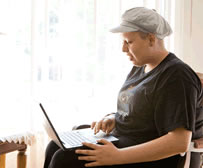Creating Home Away From Home
10 tips for finding comfort when visiting Ann Arbor for treatment

Marilena Hatzistamou had a panic attack early this year: She felt like she couldn't breathe. A chest X-ray taken at a hospital in her native Greece showed a four-inch mass sitting in her lung. So Marilena and her mother, Kathie Karagianni, boarded a plane in early March and flew to the University of Michigan Rogel Cancer Center for a biopsy.
They packed enough clothes for about a month. That was before they knew Marilena had Hodgkin's disease. Six months, a birthday and two seasons later, mom and daughter were tentatively making plans to finally return to Athens.
"We have two worlds," said Kathie, who is originally from Birmingham, Mich., and still maintains close ties to family locally. "But of course Greece is home. That's where our house is, it's where our books are."
And it's where Dad is.
And the family Chihuahua, Ritsa.
And friends.
And University of Pireaus, where 20-year old Marilena studies computer science.
Not to mention the general flow and comfort of their everyday lives.
Marilena has traveled farther than most U-M Rogel Cancer Center patients, but the issues she encountered as she uprooted her life to undergo treatment are not unique. We've put together a list of tips to help you feel more at home -- even when you're not.
10 tips for finding comfort when visiting Ann Arbor for treatment

1. Bring a piece of home with you.
Pack photos of family -- and don't forget the pets. If you have a favorite pillow, bring it with you, says Barb Rose, a U-M Rogel Cancer Center social worker. Ask your kids or grandchildren to draw pictures for you to decorate the walls of your room or temporary apartment.
2. Get your bearings.
If you were home, you'd know where to buy toothpaste or stock up on groceries. Stake out the nearest drug stores, grocery stores and Target™. Consider stocking up on fresh fruits and vegetables at Bello Vino, a local market and cancer center supporter. Talk with a volunteer at the Level B2 Courtesy Center or visit our online resource guide at mcancer.org/ thrive to find the basics.
3. Ask for help.
When people say, "If there's anything I can do," they mean it. Consider a community fund-raiser to help pay for lodging expenses, Rose said. Ask for volunteers to help in keeping up appearances at your home while you're away: The grass will still need to be cut and the snow shoveled. If you have kids, ask family or close friends if they wouldn't mind babysitting to give caregivers a break. Anything you can do to relieve nagging worries about day-to-day life will allow you to relax more and settle in.
4. Get on camera.
Marilena and her mom shared a meal every day with dad George Hatzistamou, even though he was still in Greece. Using video cameras connected to computers, the family was able to see each other and talk via Internet services like Skype and iChat. Granted, because of the time difference, George was eating dinner while they were eating breakfast, but it helped just to be able to see home, Marilena said. George, who wasn't able to visit Ann Arbor until July, also felt more connected. "It was weird," he said, adding that because of the teleconferencing he felt like he knew the place where his wife and daughter were staying without ever having been there before.
5. Become Web-savvy.
Communicate with family and friends. There are a number of ways to connect through social media sites like Facebook, Instagram and Twitter.
6. Join a support group.
Marilena was skeptical about support groups, but she went anyway. What she found was a group of people with similar concerns -- people who could understand what she was going through. "It turned out it really helped," she said. "It's a good way to get to know people when you don't know anyone in the area, too." For more information, visit the Cancer Support Community of Ann Arbor; or visit the national site to find groups near you.

7. Get to know Ann Arbor.
Take a walk on a nice day through the Nichols Arboretum, just around the corner from the Rogel Cancer Center. Have lunch in Kerrytown, a charming shopping district. For Marilena, walking Briarwood Mall was a nice way to get out and about -- although she only went in the last hour before closing so that her compromised immune system wasn't exposed to crowds. Visit the Courtesy Center for maps and directions. Or, visit the web site for Ann Arbor Chamber of Commerce.
8. Cook a good meal.
If you have access to a kitchen, cook your favorites. Kathie made a point of continuing to cook Greek food at the hotel. Their room featured a window overlooking a small pond, so Marilena and Kathie would playfully imagine it to be like home. "We'd say, 'Come have coffee on the veranda,'" Marilena said.
9. Divert yourself.
Never got around to seeing last year's Oscar-nominated films? Always wanted to watch Ugly Betty, but never had the time? Catch up on your pop culture. Consider a subscription to a DVD-rental service like Netflix, which will deliver DVDs to your door. Brush up your Scrabble skills or pull out that deck of cards. Take an Art for Fun Class. Read those novels that have been on your list. The Ann Arbor District Library offers borrowing privileges to patients who will be staying long term.
10. Remember, you're still you.
Continue activities you pursued at home.  If you have children, take an active role in monitoring school progress, Rose said. Before Marilena was diagnosed with Hodgkin's disease, she regularly read the Harry Potter stories aloud to her mother, who originally wasn't too interested in the series. Marilena lent different voices to each of the characters, making it feel more like a stage show than a simple reading. The two finished the series and started it over again while in Ann Arbor. A few months ago, Kathie wrote a letter to Potter author J.K. Rowling to tell her how much the books meant to them. Shortly after, a package arrived containing a quill pen to inspire Hatzistamou to stay in touch with friends, a Tri-Wizard Tournament Cup as a medal of valor and a hand-written letter of thanks from Rowling (left). "Harry Potter's been our lifeline," Kathie said. "It's really kept us together."
If you have children, take an active role in monitoring school progress, Rose said. Before Marilena was diagnosed with Hodgkin's disease, she regularly read the Harry Potter stories aloud to her mother, who originally wasn't too interested in the series. Marilena lent different voices to each of the characters, making it feel more like a stage show than a simple reading. The two finished the series and started it over again while in Ann Arbor. A few months ago, Kathie wrote a letter to Potter author J.K. Rowling to tell her how much the books meant to them. Shortly after, a package arrived containing a quill pen to inspire Hatzistamou to stay in touch with friends, a Tri-Wizard Tournament Cup as a medal of valor and a hand-written letter of thanks from Rowling (left). "Harry Potter's been our lifeline," Kathie said. "It's really kept us together."
